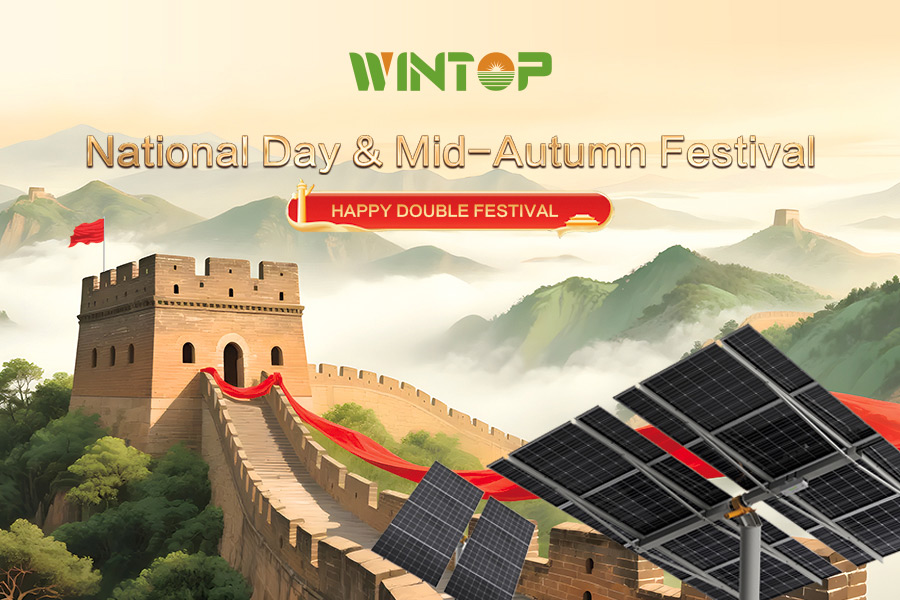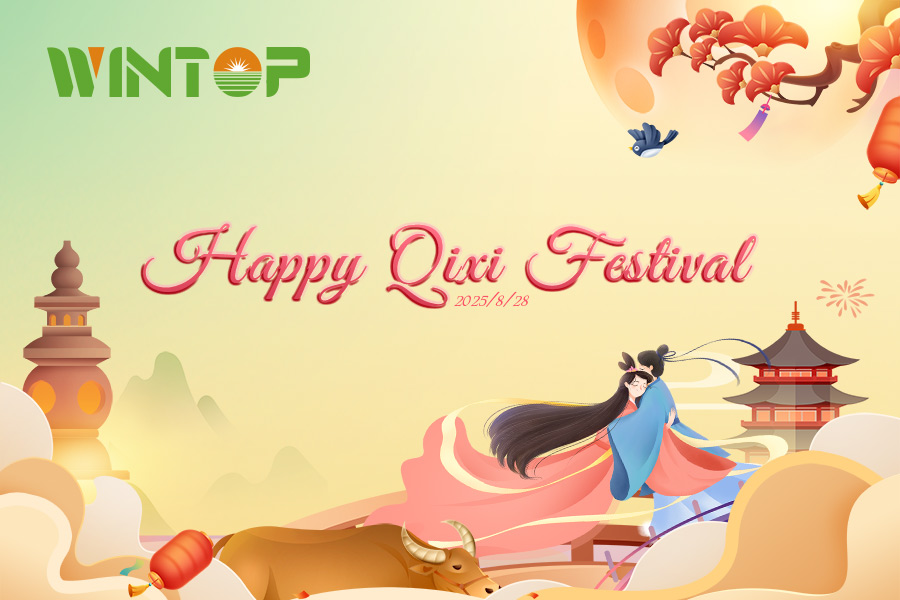

The Christmas bell rings, bringing warmth and beauty as promised. Thank you to every partner who moves forward side by side. It is your wholehearted effort that makes ordinary days shine brightly. Thank you to every customer who trusts us. It is your choice and support that give us the strength to move forward. May the stars of Christmas light up our path forward, and may the new year be warm, smooth, and worry free!

The National Day of the People's Republic of China, also known as National Day, National Day, China National Day, or National Day Golden Week, is a public holiday in the People's Republic of China aimed at celebrating National Day. It falls on October 1st every year. According to Article 2 of the State Council's "National Holidays and Commemorative Days Holiday Measures", the National Day holiday lasts for 3 days each year, on October 1st, 2nd, and 3rd. On October 1, 1949, the Central People's Government of the People's Republic of China was established; On December 2nd, the Fourth Meeting of the Central People's Government Committee accepted the proposal of the National Committee of the Chinese People's Political Consultative Conference and passed the "Resolution on the National Day of the People's Republic of China", deciding to designate October 1st every year as the National Day of the People's Republic of China. After the founding of the People's Republic of China, the form of celebrating National Day has undergone several changes. From 1950 to 1959, large-scale celebrations were held every year, accompanied by military parades. From 1960 to 1970, grand rallies and mass parades were held annually in front of Tiananmen Square, but no military parades were held. From 1971 to 1983, it was celebrated annually through large-scale park activities and other forms, without any mass parades. In 1984, a military parade and mass celebration parade were held again. After 1985, National Day was mostly celebrated in other forms, without military parades or mass celebrations. Only in 1999, 2009, and 2019, military parades and mass celebrations were held again. National Day is a characteristic of the country, which emerged with the establishment of the People's Republic of China and became particularly important. It has become a symbol of an independent country, reflecting China's national and political system. National Day is a new and universal holiday form that carries the function of reflecting the cohesion of China and the nation. At the same time, the large-scale celebration activities on National Day are a concrete manifestation of the government's mobilization and appeal. Displaying strength, enhancing national confidence, reflecting cohesion, and exerting appeal are the three basic characteristics of the National Day celebration.

Qixi Festival is a traditional folk festival in China. As the seventh day of the seventh lunar month is the birthday of Qixi, and "Qiqiao" is one of the important customs of "Qixi's Birthday", it is also known as "Qiqiao Festival". Qixi Festival is also known by other names such as Qiqiao Festival, Qixi Festival, Daughter's Festival, Qinianghui, Qixi Sacrifice, Niugongniupo Day, and Qiaoxi. The Chinese Qixi Festival falls on the seventh day of the seventh lunar month. The first appearance of "the seventh day of the seventh lunar month" in extant ancient books is in "Simin Yueling" written by the Eastern Han scholar Cui Shi Qixi originally originated from the ancient worship of star constellations and later gave rise to the love story of the Cowherd and the Weaver Maid. It is a romantic night for young girls to worship star deities and pray for ingenuity. The customs and practices of Qixi became abundant and perfect during the Six Dynasties period, and after the Han and Wei dynasties, it mainly became a festival to express women's wishes, compete, and showcase women's ingenious craftsmanship. People eat foods such as Qiaoguo (a kind of fruit) and Qiaoya noodles on Qixi Festival, and engage in a series of activities to pray for ingenuity, such as threading a needle, welcoming the spider for ingenuity, keeping vigil and making wishes, exposing books to the sun, and drying clothes. In the early days, Qixi Festival was a courtyard-style festival for praying for ingenuity. During the Tang and Song dynasties, it evolved into a social festival, and in the Ming and Qing dynasties, it returned to the courtyard. In contemporary times, Qixi Festival has expanded from a family festival to a social festival, where people can participate in ritual performances to strengthen local social connections and enrich the lives of local people. The Qixi Festival provides us with a rich cultural heritage, encompassing views on love, labor, perseverance, morality, and responsibility. It stands as a typical example of Chinese festivals revitalizing in the process of globalization. On May 20, 2006, the Qixi Festival was included in the first batch of national-level intangible cultural heritage lists. In 2008, the Qiqiao Festival customs in Xihe, Gansu Province, were listed in the second batch of intangible cultural heritage. In 2011, the Qixi customs in Tianhe, Guangdong Province, and Wenling, Zhejiang Province, were included in the third batch of intangible cultural heritage. In 2014, the Qixi customs in Yunxi, Hubei Province, were listed in the fourth batch of intangible cultural heritage. The Qixi Festival also exerts influence on neighboring Asian countries, with Japan, Vietnam, and the Korean Peninsula celebrating their own versions of the festival.

Father's Day is a day to express gratitude to one's father. Started around the beginning of the 20th century, originating in the United States, and now widely spread around the world, holiday dates vary by region. The most common date is the third Sunday of June each year. In 1910, the world's first Father's Day was born in the United States, initiated by Mrs. Bruce Dodd. Mrs. Dodd's father, Mr. William Smart, took on the responsibility of raising and educating six children alone after his wife's death. After decades of hard work, the children finally grew up, but Mr. Smart passed away due to overwork. After attending the Mother's Day Thanksgiving service at the church, Mrs. Dodd deeply felt that her father's love and hardships in raising children were no less than those of any mother. Therefore, she hoped to have a special day to commemorate great fathers all over the world. On Father's Day, people choose specific flowers to express their respect and longing for their fathers. Wearing a red rose expresses love and affection for the living father, while wearing a white rose expresses mourning for the deceased father. The purpose of establishing "Father's Day on August 8th" during the Republic of China period was to commemorate the fathers who fought bravely and killed enemies in the war. There is no official Father's Day in the People's Republic of China. But mainland Chinese people are accustomed to using the third Sunday of June as Father's Day; But in China before 1949 and in the current Taiwan, China region of China, Father's Day was on August 8.

The Loong Boat Festival is one of the four traditional festivals in China. It is the fifth day of the fifth lunar month. It is a folk festival that integrates worship of gods and ancestors, praying for blessings and exorcism, celebrating entertainment and eating. There are more than 20 nicknames, such as the Dragon Boat Festival, Loong Boat Festival, Chongwu Festival, Chongwu Festival and Tianzhong Festival. It is a traditional festival of Han, Shui, Naxi, Tibetan, Yi, Dai, Gelao ethnic group, Pumi and other ethnic groups. As a festival, Loong Boat Festival was formed in the Han Dynasty. There is a record in the "Customs and General Principles" by Ying Shao of the Eastern Han Dynasty that on the fifth day of the fifth lunar month, people should guard against military service ghosts and prevent diseases and epidemics. The origin of the Loong Boat Festival has varied from ancient times to the present. The main arguments are: the theory of commemorating Qu Yuan, the theory of welcoming the Tao God (Wu Zixu became the Tao God after his unjust death), the theory of evil days, the theory of dragon festivals (that is, the theory of sacrificing the dragon totem), and the theory of the summer solstice. The origin of the Loong Boat Festival covers the ancient astrological culture, humanistic philosophy and other aspects, and contains profound and rich cultural connotation. In the process of inheritance and development, it blends a variety of folk customs. Due to different regional cultures, there are differences in the content or details of customs. The main customs of the Loong Boat Festival include hanging the Zhong Kui statue, hiding from the noon, pasting the Wu Ye Fu, hanging calamus, wormwood, traveling to various diseases, wearing sachets, preparing animals, racing Loong Boat, contesting martial arts, hitting balls, playing swings, painting realgar, drinking realgar wine, calamus wine, eating five poison cakes, salted eggs, Zongzi and seasonal fresh fruits. In addition to the superstitious activities that have gradually disappeared, the rest have spread to all parts of China and neighboring countries. In May 2006, the State Council included the Loong Boat Festival in the first batch of national intangible cultural heritage lists. Since 2008, Loong Boat Festival has been listed as a national legal holiday. In September 2009, UNESCO officially approved its inclusion in the List of Representative Works of Intangible Cultural Heritage of Humanity. Loong Boat Festival became the first festival in China to be included in the World Intangible Cultural Heritage.

Network Valentine's Day is a love festival in the information age, celebrated annually on May 20th and 21st. The festival originated from the metaphor of "520" as "I love you" in singer Fan Xiaoxuan's "Digital Love" and the close connection between "I love you" and "online lover" in musician Wu Yulong's online songs. Later on, "521" was gradually given the meaning of "I am willing, I love you" by couples. Online Valentine's Day "is also known as" Wedding Day "," White Day "," Spoiler's Day ", and" Love Day ". In this trendy, youthful, spiritual, and implicit festival, "520 (521) 1314 I love you (I am willing) for a lifetime" is its classic digital quote, and Wu Yulong's "Online Lover" is the theme song of the festival. People boldly say (show) love through (mobile phone, traditional PC) Internet (WeChat, QQ, microblog, forum, etc. as platforms) or mobile phone text messages, and even send gifts (red envelopes) to convey love and find love on blind dates. There are also countless couples gathering to register for marriage and hold a grand wedding banquet. Many businesses also take the opportunity to carry out group buying, discounts and other promotional activities, which has set off a wave of holiday fever online and offline. With the increasing number of festival participants, various media (newspapers, television, the Internet, etc.) are competing to report the grand events of 520 and 521 "Internet Valentine's Day", "Daying", and "Pettish Day".

Mother's Day is a holiday celebrated to thank mothers, held on the second Sunday of May each year. On this day, mothers usually receive gifts and intentions from their children, such as a bright bouquet of carnations or a delicate bouquet of lilies, among others. Mother's Day originated in ancient Greece, where on January 8th each year, ancient Greeks paid tribute to Rhea, the mother of the gods. In the middle of the 17th century, Mother's Day spread to England, and the fourth Sunday of Lent was regarded as Mother's Day by the British. The origin of modern Mother's Day can be traced back to the United States. It is said that in 1876, during the Civil War, Anna Mary Jarvis commemorated and praised mothers around the world in a church. In 1907, Mrs. Jarvis' daughter Anna invited her mothers to hold a worship service. In 1910, Mother's Day was established in Philadelphia. In 1914, the United States Congress officially named the second Sunday of May as Mother's Day, and carnations quickly became a symbol of Mother's Day. It is said that carnations represent the tears shed by the Virgin Mary when Jesus was crucified. In the 1980s, Mother's Day gradually gained acceptance among the people in mainland China. At the end of the 20th century, with the increasing integration of China and the world, Mother's Day has been increasingly popularized in Chinese Mainland and accepted the concept of Mother's Day. On the second Sunday of May every year, Chinese people and people from other countries all over the world express their gratitude to their mothers in various ways. In December 2006, organizations such as the Cultural Committee of the Chinese Association for Democracy and People's Livelihood designated the second day of the fourth lunar month, which is the day when Mencius was born, as Chinese Mother's Day. Promoting the culture of virtue and filial piety on Mother's Day can not only make families more harmonious, but also make society more harmonious and civilized. Selfless maternal love dedicates everything to her children, and children should promote and inherit the culture of filial piety to maintain family harmony, promote social stability and development, making Mother's Day more meaningful.

International Labor Day is an important holiday celebrated by workers worldwide, with the following core message: Origin and Historical Background Background of the Workers' Movement: Originating from the Chicago Workers' Strike in the late 19th century in the United States. On May 1, 1886, over 200000 workers in Chicago went on strike to fight for an 8-hour workweek. Establishment time: In 1889, the Paris Congress of the Second International passed a resolution to designate May 1st as International Labor Day to commemorate the workers' movement. Historical significance: It symbolizes the victory of the working class in fighting for their rights and marks a milestone in the unity and struggle of workers. Time and Scope Date: May 1st every year, recognized as a statutory holiday in over 80 countries worldwide. Exception countries: Due to historical reasons, countries such as the United States and Canada have set Labor Day on other dates. Alternative names and international names Common names: International Labor Day, also known as "May Day" or "International Day of Demonstrations and Processions". English expression: The official name is "International Workers' Day", and it is also widely used as "May Day" or "Labour Day". China's Labor Day Introduction time: In December 1949, the State Council of the Central People's Government of China officially designated May 1st as Labor Day. Commemorative activities: After 1989, the State Council commended the national model worker and exemplary individual every five years to promote the spirit of labor. International Labor Day is not only an opportunity for vacation and celebration, but also a manifestation of the spirit of global solidarity among workers.

Qingming Festival is one of the traditional Chinese festivals, also known as the Outing Festival. On April 4th every year, people go to their ancestors' graves to sweep, worship, and remember their deceased relatives and ancestors. The Qingming Festival has a long history, born during the Zhou Dynasty in ancient China, and has a history of thousands of years. The Qingming Festival holds profound significance for each and every one of us. Qingming Festival reminds us to cherish life, remember our ancestors, and be grateful for their love and dedication. On this special festival, we are not only here to sweep graves and offer sacrifices, but also to connect with our deceased loved ones and ancestors, expressing our nostalgia and longing for them. On this holiday, you can go home to visit relatives, reunite, and spend time with your family. At the same time, we also encourage everyone to relax both physically and mentally during this festival, step outside, feel the breath of spring, and enjoy the beauty of nature. This is very important for relieving work pressure and enhancing physical and mental health. During the statutory holiday of Qingming Festival in China from April 4th to 6th, there were three days off
Categories
New Products
Tin Roof Rapid Solar Mounting System with Hanger Bolt Read More
Residential Small Solar Easy Bracket Kit for Home Balcony Read More
Automatic Single Pile Solar Tracker with 10 PV Panels Read More
Angle Adjustable Aluminum Easy Solar Panel Bracket for Garden Read More
Intelligent Single Post Dual Row Solar Tracking System Read More
5000ES Solar Off-Grid Energy Storage Inverter Supplier Read More
Multi Drive Double-Sided Single Axis Tracker System Read More
© Copyright: 2026 Xiamen Wintop New Energy Tech Co., Ltd.. All Rights Reserved.

IPv6 network supported
Friendly Links:
Integrated Solar System